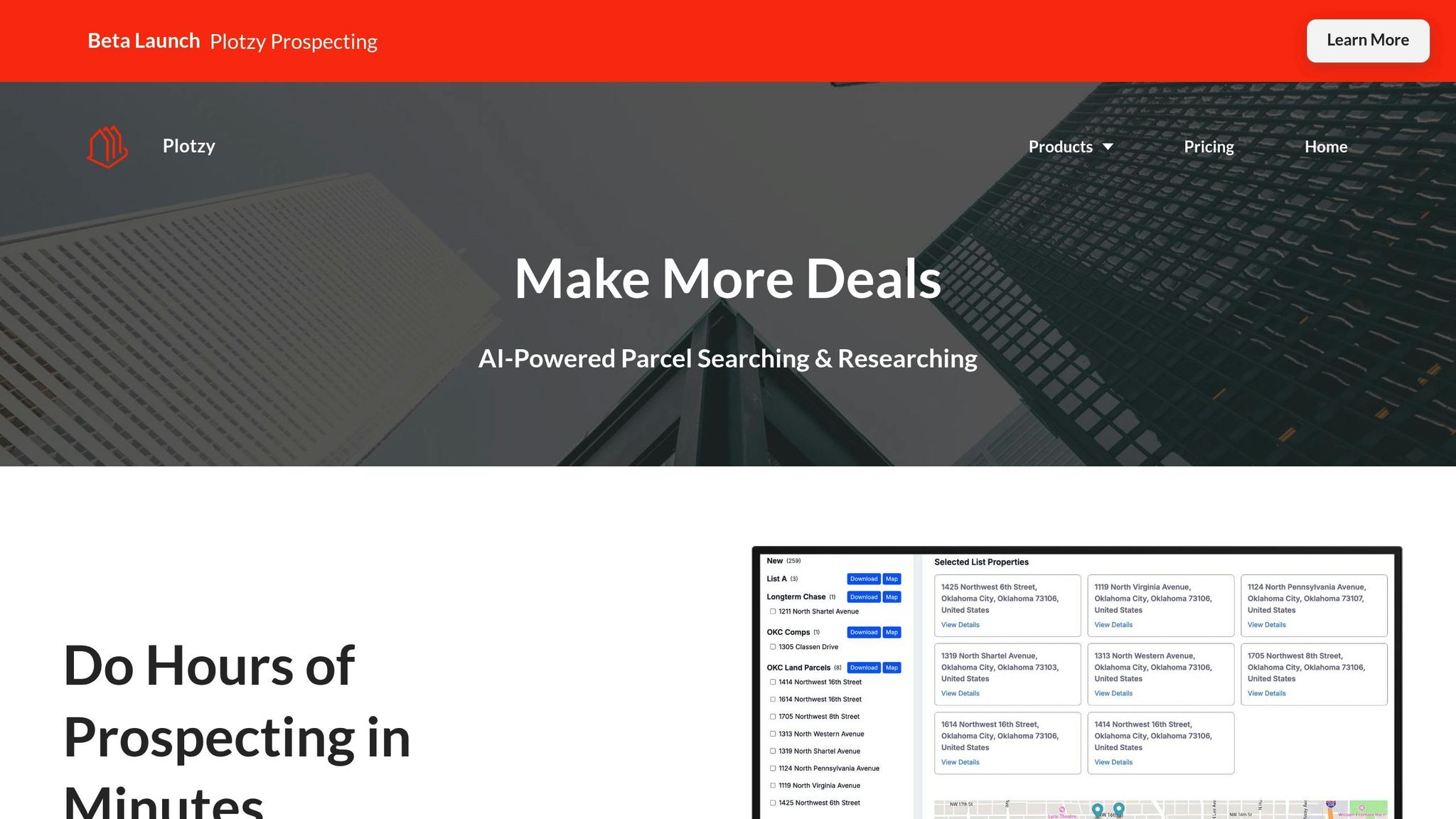Managing commercial real estate (CRE) transactions is challenging. These deals involve long cycles, multiple stakeholders, and extensive data. A CRE CRM is a specialized tool designed to simplify these complexities, helping professionals close deals more efficiently.
Key Takeaways:
- What is a CRE CRM? A tailored system for CRE professionals to manage properties, leads, and transactions.
- Why it matters: It streamlines workflows, automates repetitive tasks, and centralizes data for easier access.
- Top features: Advanced deal tracking, property data management, lease automation, AI-powered insights, and mobile access.
- AI in CRE CRM: Predictive analytics, intelligent property matching, and automated workflows save time and improve decision-making.
- Choosing the right CRM: Focus on ease of use, customization, integration, security, and scalability.
AI-driven tools like Plotzy are leading the way, offering features like automated owner contact retrieval and zoning research. By adopting a CRE CRM, you can save hours weekly, reduce errors, and focus on building relationships and closing deals.
Top 6 Commercial Real Estate CRMs
Key Features of a CRE CRM
A CRE CRM must tackle the industry's unique challenges with tools like advanced deal tracking, property data management, lease automation, and market analytics.
According to a 2023 survey, 80% of CRE firms view technology as crucial for overcoming challenges and driving growth. With this shift toward tech-focused solutions, understanding the essential features of a CRE CRM is vital for staying ahead. These features are the backbone of effective collaboration and efficient deal management.
Multi-Contact and Deal Tracking
CRE transactions often involve multiple stakeholders and lengthy negotiation timelines, making dynamic contact management and customizable deal tracking indispensable.
A strong CRE CRM offers tools to manage stakeholder details, communication history, and deal records. It goes beyond basic contact information, tracking investment profiles, property preferences, past deals, and personalized notes.
Managing the deal pipeline is especially critical for high-value transactions. The CRM should allow users to customize deal stages and follow complex opportunity lifecycles, such as lease renewals, sale negotiations, and due diligence. Multi-property tracking ensures professionals can handle several transactions simultaneously without losing track of critical details.
Matt Ehrlich, Senior Vice President at Rexford Industrial, highlights the importance of comprehensive deal tracking:
"The CommercialEdge offerings streamline our workflows, providing us with complete deal pipeline oversight throughout our region. The end-to-end solution helps us centralize marketing, syndicate availability, manage the deal pipeline and take qualified deals to lease execution."
Another key feature is communication integration. A well-designed CRM connects email, phone calls, SMS, and chat directly to each deal record, creating a unified communication history accessible to the entire team.
Property and Lease Data Management
A CRE CRM should simplify the organization, tracking, and analysis of detailed property information, including property history, current status, and financial data.
Centralized property inventory tools make it easy to search through current, past, and potential listings without juggling multiple spreadsheets or databases. This streamlined approach saves time and reduces errors during property research.
Lease tracking is another critical feature, especially for property managers and landlords. Automated reminders and updates ensure smooth lease renewals and timely tenant communication. Some advanced systems even include virtual assistant capabilities to handle data entry, minimizing manual work and improving accuracy.
Stacking plans offer a visual representation of property space, showing lease expirations and tenant details at a glance. For instance, AscendixRE CRM includes stacking plan software with over 230 fields to describe properties, helping users identify vacant spaces and monitor lease timelines.
Integration with property data services ensures real-time updates on ownership changes, recent sales, and financial histories. This keeps property information accurate and up-to-date without requiring manual input.
Integrated Calendars and Task Automation
Efficient scheduling and automation are key to managing the fast-paced workflows of CRE professionals. With numerous deadlines, lease renewals, and meetings to juggle, integrated calendar systems within a CRE CRM can automatically schedule follow-ups and set reminders for important dates.
Automation takes care of repetitive tasks like follow-ups, deadline tracking, and report generation. It can also send reminders for lease renewals, property inspections, and client check-ins, freeing up time for more strategic activities.
Administrative automation, such as rent tracking, financial reporting, and document management, allows CRE professionals to focus on relationship-building and closing deals.
Steve Schmid from Macerich underscores the productivity gains:
"Deal Manager has proven to be a well-rounded CRM tool to assist our dealmakers in better managing leads so they can be even more productive. Deal Manager's sophisticated reporting helps our executives make data-driven decisions to lease smarter and more efficiently."
Customization is key when it comes to automation. Different CRE roles - whether brokers, developers, or property managers - have unique workflows, and the CRM should adapt to these needs without forcing rigid templates.
Mobile access is another must-have. With CRE professionals often working on the go, cloud-based systems ensure they can manage calendar updates, complete tasks, and track deal progress from anywhere, maintaining productivity no matter where they are.
AI-Powered Tools in CRE CRM
Artificial intelligence is reshaping how professionals in commercial real estate (CRE) manage relationships and close deals. While earlier CRM tools focused on automating repetitive tasks, AI takes it further by providing predictive insights that drive smarter decision-making. In fact, 89% of industry leaders believe AI will be crucial for staying competitive by 2025. The market for AI tools in real estate is projected to hit $41.5 billion by 2033, with AI expected to play a role in 70% of CRE activities by 2030.
These AI-powered CRM systems are already making an impact. Automated workflows, for example, are saving real estate professionals over 15 hours a week on administrative tasks. That’s more time for building client relationships and closing deals. This efficiency lays the groundwork for even deeper AI integration in the future.
Applications of AI in CRE CRM
AI is tackling some of the most time-consuming challenges in CRE CRM by enhancing functionality in several key areas:
- Predictive Lead Scoring: By analyzing massive datasets, AI identifies prospects most likely to buy or sell. For instance, Smartzip’s predictive analytics tool achieves a 72% accuracy rate in pinpointing likely sellers.
- Automated Data Capture and Enrichment: AI keeps databases fresh by automatically updating market data, ownership records, and financial histories. This ensures accuracy while freeing up professionals for more strategic tasks.
- Intelligent Property Matching: AI learns from past interactions to recommend properties that align with client needs, speeding up the prospecting process and improving client satisfaction.
- Behavioral Analysis: By tracking client actions - like email opens, website visits, and document downloads - AI helps professionals prioritize follow-ups and optimize communication timing.
- Market Trend Analysis: AI processes a wide range of data, including local trends, spending habits, property sales, and demographic changes. This provides actionable insights that go beyond what traditional CRM systems can offer.
Unlike older CRMs that rely on static reminders and basic lead scoring, AI-powered platforms use dynamic, behavior-driven triggers and predictive analytics to offer a more refined approach. Plotzy is one platform that has embraced these advanced features to address the unique challenges of CRE professionals.
How Plotzy Uses AI for CRE Professionals

Plotzy leverages AI to deliver tailored solutions for CRE professionals, streamlining workflows and enhancing productivity. Here’s how:
- AI-Powered Parcel Search: Plotzy simplifies the research process by filtering properties based on zoning and other criteria, saving significant time during the early stages of a deal.
- Automated Owner Contact Retrieval: One of the biggest bottlenecks in CRE is finding accurate owner contact information. Plotzy automates this process, pulling data from multiple sources to enable quick outreach to potential sellers or lessors.
- Intelligent Zoning Research: Navigating zoning regulations can be complex. Plotzy analyzes municipal zoning data to provide instant insights into permitted uses, development restrictions, and compliance requirements - ideal for developers and investors evaluating multiple sites at once.
- Comprehensive Property Reports: The platform compiles key data into professional, easy-to-digest reports that support investment decisions. Plotzy’s zoning layers also overlay this information onto maps, allowing users to visually identify properties that meet specific development criteria.
Plotzy’s tools aim to complement human expertise rather than replace it. By automating data-heavy tasks, professionals can focus on building relationships and making strategic decisions.
Additionally, Plotzy’s AI tools enhance off-market deal sourcing - a critical advantage in a competitive environment. By automating research that once required multiple platforms and manual verification, the platform helps professionals identify and contact property owners before opportunities become widely known. This efficiency, combined with cost savings equivalent to three full-time employees, makes Plotzy a powerful ally in today’s fast-paced real estate market.
sbb-itb-11d231f
Strategies for Getting the Most from CRE CRM
The real power of a CRM lies in how effectively you use it. By tapping into its full potential, you can streamline operations and close more deals.
Streamlining Lead Management and Outreach
Managing leads effectively starts with staying organized and automating repetitive tasks. Your CRM should act as the central repository for all prospect information, but many professionals struggle with scattered data and inconsistent follow-ups.
To address this, segment your leads based on their sources and set up automatic tagging to trigger tailored workflows. For instance, leads from referrals might require a different approach than those from cold outreach or marketing campaigns.
Use lead scoring to prioritize prospects most likely to convert. Factors like budget, timeline, decision-making authority, and engagement level can help you focus on high-potential opportunities.
Automation is another game-changer. Track prospect behavior - such as downloads or extended time spent on specific property pages - and use that data to send timely, personalized follow-ups.
Modern CRMs also make personalization at scale possible. Instead of generic emails, craft messages that reflect a prospect’s specific interests, like their preferred property type or recent market activity in their target area. For example, SalesBread achieved significant results by generating nearly 7,000 new prospects in two years through highly personalized LinkedIn outreach.
Automated email campaigns can further enhance engagement. Create sequences tailored to different prospect types. Investors might receive market analysis reports, while developers could benefit from zoning updates or demographic trends. Let your CRM handle the timing and content based on each prospect’s behavior and preferences.
Once your lead management is in order, the next step is ensuring smooth collaboration within your team.
Improving Collaboration and Deal Progress
Collaboration often falters when teams work in isolation or rely on disconnected systems. A well-integrated CRM eliminates these challenges by offering shared visibility into deal statuses and histories.
When your CRM integrates seamlessly with tools like Outlook or Gmail, it prevents data silos and ensures smooth workflows. Switching between platforms can lead to lost information and stalled deals, so integration is key. Rob Sattler, Senior Vice President at Cresa New York, highlighted this during a CRM migration. He expected to retain only 60%–70% of his data but achieved 95% success thanks to strategic integration planning.
Transparency is crucial, but not everyone on your team needs access to all information. Configure your CRM to provide updates to relevant stakeholders while maintaining data security. For instance, set up automatic notifications for key milestones or required actions.
Landmark Advisory Services offers a compelling example of success. By centralizing their CRM, they improved deal tracking, organized client records, and managed follow-ups proactively, staying competitive in a crowded market.
Mobile access is another must-have. Your team should be able to update deal statuses and access critical information in real time.
Automate task assignments to keep things moving. When a new lead enters the system, the CRM can assign it to the right team member and create reminders for follow-ups. Escalation rules can ensure unresponsive leads are reassigned after a set period.
Finally, visualize your pipeline to spot potential bottlenecks. Use dashboards to monitor deal stages, expected close dates, and any roadblocks, allowing managers to address issues early and reallocate resources as needed.
Using Data Insights for Better Decisions
Once your operations and collaboration are running smoothly, it’s time to dig into your CRM’s data to make smarter decisions.
Your CRM can turn raw data into actionable insights that guide your strategy. Start by tracking key performance indicators (KPIs) like lead conversion rates, average deal size, time to close, and the effectiveness of different lead sources. Real-time dashboards can highlight progress and pinpoint areas needing improvement.
Use your CRM to analyze market trends and uncover opportunities. For example, patterns in client inquiries or shifts in demand for certain property types can help you refine your prospecting strategy.
Tailor your outreach by creating targeted marketing campaigns. Segment your database based on property interests, investment size, or geographic focus to achieve higher response rates and attract better-qualified leads.
Your CRM should also help you evaluate portfolio performance. Compare individual deals and overall portfolio metrics against market benchmarks to identify which property types or regions deliver the best returns.
Monitor your team’s performance to identify strengths and areas for improvement. Metrics like lead response time, conversion rates, and deal velocity can inform training and resource allocation.
"Data-driven decision-making is the cornerstone of success in today's commercial real estate landscape." - RealNex
The top-performing CRE professionals don’t just react to market changes - they anticipate them. By analyzing historical data, market forecasts, and financial metrics, you can confidently evaluate investment opportunities and optimize your portfolio.
To stay ahead, review your CRM processes regularly. Quarterly evaluations can help you identify what’s working, what isn’t, and how to adapt as technology and market conditions evolve.
A commitment to data-driven strategies ensures you remain agile and competitive. Firms that leverage insights to act on emerging opportunities often outpace those still playing catch-up.
Choosing the Right CRE CRM
Selecting a CRM for commercial real estate (CRE) is no small task - it’s about aligning the platform with your business needs and future growth. CRE transactions are complex, involving lengthy sales cycles, intricate negotiations, and communication across multiple parties. Generic CRMs often fall short in handling these unique challenges, which is why a tailored solution is essential.
Building on the must-have features and strategies discussed earlier, here are the key factors to consider when evaluating and choosing the best CRM for your CRE business.
Key Evaluation Criteria
To find a CRM that meets your operational needs and supports your growth, focus on these critical areas:
- Business Structure and Growth Goals: Whether you're a small brokerage with a handful of agents or a large firm managing hundreds of properties, your CRM needs will vary. A lightweight CRM might work for the former, while the latter may require an enterprise-grade solution.
- Ease of Use: Even the most advanced CRM is useless if your team struggles to operate it. Test potential systems using real data, and gather input from the people who will rely on it daily.
- Customization: Look for a CRM that allows you to tailor fields for property types, zoning details, and deal structures. This flexibility ensures the system aligns with your specific workflows.
- Integration: Seamless compatibility with your existing real estate tools is crucial to avoid data silos and ensure smooth collaboration across teams.
- Security: Given the sensitive financial information involved in CRE transactions, prioritize platforms with strong permission settings, encryption, and industry-standard compliance measures.
- Mobile Access: CRE professionals spend much of their time in the field. A CRM with robust mobile functionality is a must-have for accessing data and staying productive on the go.
- Scalability: Choose a system that can grow with your business. Whether it’s vertical scalability (adding resources) or horizontal scalability (spreading workloads across systems), your CRM should handle increased demands without slowing down.
"The selection requires a disciplined approach, dedication of time to review the various options and attention to detail on what separates each solution." - Kateryna Zhuk
Comparison of CRM Features
When comparing CRM options, focus on features that directly impact CRE operations. Some of the most valuable include:
- Advanced automation tools and workflow management
- AI-driven insights like predictive analytics and lead scoring
- Comprehensive property data management for zoning, lease terms, and financial projections
- Seamless integration with your existing suite of tools
- Transparent total cost of ownership, accounting for setup, training, data migration, and ongoing support
The CRM market is growing rapidly, with projections reaching $82 billion and an annual growth rate of 12%. This reflects the increasing demand for solutions that improve sales and marketing efficiency in CRE.
"The growing need for improved sales and marketing efficiency and enhanced client relationship management drives businesses to adopt advanced CRM features such as predictive analytics, AI-driven lead scoring, and automated workflows." - Erik Perison, US TPS Business Development Manager, Thermon
AI-powered features are becoming a game-changer. For example, integrating social and mobile capabilities into CRM systems has been shown to increase sales productivity by 26.4%. Additionally, robust property data management is critical for handling the complexity of CRE. A CRM that supports detailed fields - like zoning information, tenant details, lease terms, and financial projections - can streamline your operations significantly.
Finally, ensure the CRM supports future integrations through APIs and webhooks. Remember to evaluate the total cost of ownership, which includes not just subscription fees but also setup costs, training, data migration, and ongoing support.
The ideal CRM should feel like an extension of your team, simplifying the complexities of CRE transactions and empowering your business to thrive.
Conclusion
The commercial real estate (CRE) industry is undergoing a rapid transformation. In fact, 89% of industry leaders believe AI will be essential for staying competitive by 2025. What started as basic contact management tools has evolved into CRE CRMs that are now powerful platforms capable of driving business success.
Consider this: automated workflows can save professionals over 15 hours per week, and AI-powered systems offer 24/7 engagement while significantly reducing staffing demands. The numbers speak for themselves - by 2033, the global market for AI tools in real estate is expected to hit $41.5 billion. The question isn’t whether to adopt AI-driven CRMs but how quickly you can make the leap.
One standout in this space is Plotzy, a next-generation CRE CRM. By consolidating property data and using RAG technology, Plotzy delivers precise, context-aware insights that simplify complex tasks. From resolving zoning questions faster to streamlining property research and speeding up deal closures, Plotzy is redefining efficiency in CRE.
Whether you’re running a small brokerage or managing a portfolio of hundreds of properties, the right CRM can be a game-changer. Plotzy’s AI-powered tools - like parcel searching and owner contact information retrieval - equip professionals with the resources they need to stay competitive, close deals faster, and work more effectively.
As CRE continues to evolve, one thing is clear: embracing AI-powered CRMs today is the key to unlocking tomorrow’s success.
FAQs
How does AI improve CRE CRM systems, and what key benefits does it provide for real estate professionals?
AI is transforming CRE CRM systems by taking over repetitive tasks like data entry, lead scoring, and customer follow-ups. This automation frees up real estate professionals to focus on what truly matters: building relationships and closing deals. Plus, AI's ability to process large amounts of data quickly means it can uncover trends and provide actionable insights, helping professionals predict market shifts and make smarter decisions.
Through predictive analytics, AI helps anticipate client needs, making interactions more strategic and timely. Automated reporting also plays a key role, saving time and improving accuracy in day-to-day operations. On top of that, AI-powered tools elevate customer service with personalized communication and stronger security measures, giving real estate professionals an edge in an industry that moves at lightning speed.
What should I look for in a CRE CRM to ensure it meets my business needs and supports long-term growth?
When selecting a CRE CRM, it's important to focus on features that match your business needs and processes. Choose a platform that can grow with you, offering flexibility and the ability to adjust as your business evolves. Integration capabilities are key - ensure the CRM works well with tools you already rely on, like email, marketing platforms, or accounting software, to keep everything running smoothly.
Ease of use should also be a priority. A CRM that's simple to navigate will encourage your team to use it effectively. Look for mobile access to stay productive while on the move and ensure the system has strong data protection measures to safeguard client information. A CRM that checks these boxes can help you streamline operations, manage client relationships more efficiently, and set your business up for long-term success.
How does using a CRE CRM help commercial real estate teams work more efficiently and close deals faster?
A CRE CRM acts as a central hub for commercial real estate teams, streamlining the way they manage deal-related activities. It allows team members to share updates in real time, keep track of client interactions, and organize important documents - all in one place. This setup minimizes miscommunication and keeps everyone on the same page as deals progress.
Many of these systems also come equipped with AI-driven tools that handle time-consuming tasks like data entry and follow-ups. They can even provide predictive insights to help teams focus on high-priority leads. By simplifying workflows and boosting collaboration, a CRE CRM empowers teams to make decisions faster and close deals more efficiently.


